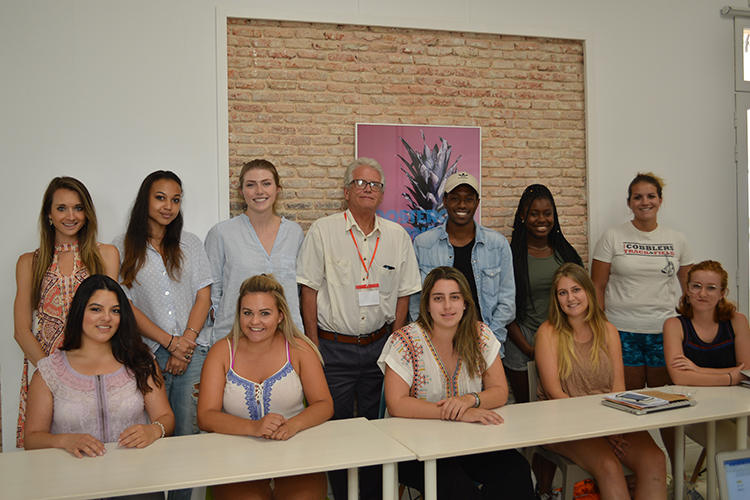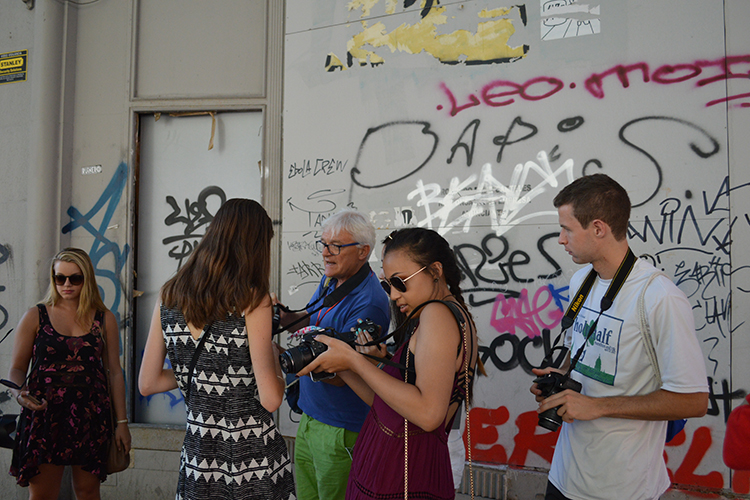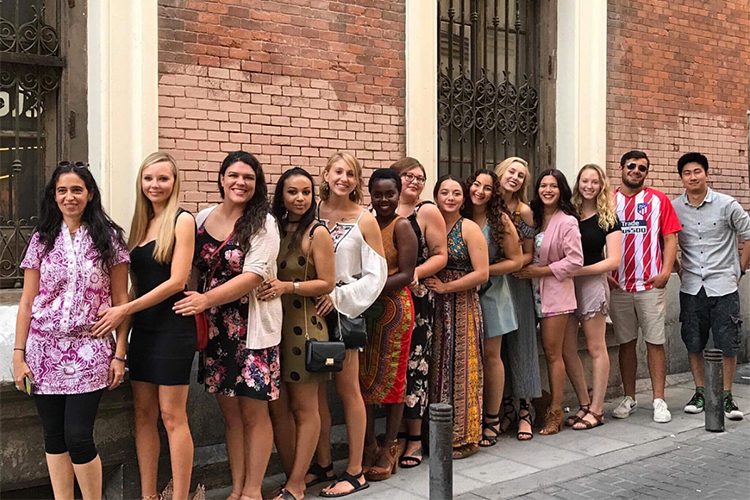Check back next week for Part II.
So, you completed a dream internship abroad. Even months after your international internship, you still post nostalgic photos of your time abroad on Instagram, with your friends, now all over the globe, commenting “miss you ♡” or “so pretty, love you!” below. Yes, your social media friends certainly know where you went, -the Facebook photo albums, too, are numerous and meticulously tagged by location.
But have you thought about leveraging your international internship for your career? Are you pursuing any strategies for marketing your international internship to future employers?
An internship abroad can be a stepping stone for a an international career, – I myself interned abroad in Madrid, Spain, for the first time at age 15 and here I am, directing ROOSTERGNN. Here are some tips for getting started with marketing your international internship.
Step #1: Reflect on your international internship

Touring the newsroom of El Mundo, one of the largest newspapers in Spain, during our Internship Seminar in Madrid, Spain, summer 2017 | ROOSTERGNN Academy
If you kept a travel blog or diary while abroad (which I highly recommend!), reflecting will come easier to you. If not, you will have to start from scratch. Either way, find a quiet location to reflect on your experience abroad. Personally, I suggest doing this on pen and paper in an internet-free environment, -to avoid being distracted by social media, email and web surfing,- but that is up to you, of course.
What did you learn and achieve while abroad?
- Language skills. Did you intern abroad in a country where another language was spoken? Did you work in that language or in English? What was your foreign language level before you went abroad and when you came back? Did you become familiar with colloquial expressions that you might not have learned otherwise?
- Cross-cultural communication skills. Communicating in another country can often require more than just learning another language. It involves becoming familiar with country-specific norms, and learning how to work with them. For example, those who have interned abroad in Spain during the summer will know that some smaller Spanish establishments, especially in towns but also in some larger cities, will close from two to five p.m. for the Spanish siesta If you had planned to purchase some crucial product for your work at that time, chances are your boss would not have been impressed if you came back empty-handed, so details like these are essential. What cultural details did you learn abroad and how did you communicate with the locals to obtain what you needed?
- Field-specific skills. By “field-specific skills” I am referring to skills that are related to the field or sector you interned abroad in. If you completed a journalism internship, did you, for example, improve your interviewing or reporting skills?
- An internship abroad is a test to your independence. It’s not only a question of whether you succeeded to buy groceries in a foreign country (although that is, of course, important!), but how you managed your time in a working environment as well. Did you improve your ability to get around on your own?
- Teamwork & leadership. If your internship involved you working in team, that is alright, too, of course. In that case, how did you integrate in the team? Were you able to listen to your supervisors to get things done? Did you ever take on a leadership role? (Getting a leadership role as an intern right off the bat is usually not the norm, especially coming in as a foreign intern. But did you ever go above and beyond what was expected of you and present a project that positively surprised your supervisors?) Or perhaps did you join an extra-curricular activity where you occupied a leadership position?
- Time management. Interning abroad means independence, and by extension, time management. How did you go about managing your time abroad? Was most of your time spent recovering from extra-curricular fiestas and traveling? And did you then not show up for work next day, making up some excuse?
- Budgeting. Along with managing your time comes managing your budget abroad. Reflect on how closely you were able to stick to your initial budget. Did you have to ask your parents for additional money? Did you get surprised by international credit card charges because you did not let your bank know ahead of time that you were traveling abroad? Quite a number of students supplement an internship abroad with side jobs as English teachers or even baby sitters. (Please note that you will have to look into the visa requirements you are traveling under to find out whether this is legal or not in the country you are interning abroad in!). If so, did you make an additional income abroad?
Step #2: Single out your strengths (and weaknesses!)

Workshop with RGNN Expert and Mentor Benjamin Jones during our Internship Seminar in Madrid, Spain, summer | ROOSTERGNN Academy
The goal of the above reflection should be figure out both your strengths and weaknesses. Your weaknesses should be what you continue to work on in the future (and yes, some employers may ask you about them, in that case you should always try to frame a weakness as an ultimate strength because you were able to learn from it).
Be specific when noting down your strengths. For example, you will need statements like: “collaborated with a multinational team of 40 writers” or “increased sales by 7% within 6 months abroad”.
Step #3: Set specific goals

Getting hands-on advice from RGNN Expert and Mentor Denis Doyle at our Internship Seminar in Madrid, Spain | ROOSTERGNN Academy
Once you have reflected on the past, you should set specific goals for yourself for your future. What are you trying to achieve? Think about:
- Are you trying to find another internship?
- Are you trying to find a full-time job?
- Is this position national or international?
- Have you found the position already and applied, or are you starting from scratch and need to find a position?
- If so, what contacts can help you find a position? What impression are you making on social media to these contacts?
- Will you need to further improve your language skills to pursue the career you want?
- Do you want to go back to the company you interned at abroad as a full-time employee?
- Are you still a student, seeking to prepare for future opportunities down the line and want to be prepared?
Again, make a note of your answers because the strategy you craft will depend on your answers. At the end of your reflection, you should have an inventory of:
- What you learned abroad
- Your strengths and weaknesses
- Your goals
- Any former resume template you were using (we will update this in the next step)
- Any former cover letter template you have been using (we will update this in the next steps as well)
- A list of your current social media profiles
This article is the first part in a series of articles on how to market your international internship. Check back next week for Part II, including:
- Resume Tips
- Cover Letter Tips
- Interview Tips
- Social Media Tips

